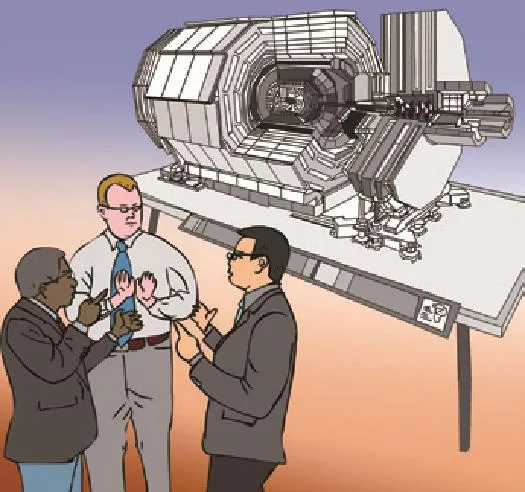Exploring the Super Particle Collider Controversy
Exploring the Super Particle Collider Controversy
Dear Readers,Forum is a column that provides a space for varying perspectives on contemporary Chinese society. We invite you to submit personal viewpoints on past and current topics(in either English or Chinese).

yanwei@bjreview.com
Please provide your name and address along with your comments
Heated debates on whether China should develop a super particle collider have recently erupted among top scientists following an assessment by a Nobel laureate. Chen-Ning Yang, a Chinese-born American physicist who won the Nobel Prize in physics in 1957 and is a professor at China's prestigious Tsinghua University, has published an article on the social media platform WeChat opposing the collider's construction.
According to Yang, the project would become an investment “black hole” with little scientifc value or beneft to society, depleting financial resources and detracting from funds for other scientifc programs. The frst stage of the program is estimated to cost 40 billion yuan ($5.9 billion) by 2030, with total costs exceeding 140 billion yuan ($20.9 billion) should construction be completed in 2050. The collider would also be four times larger than the Large Hadron Collider (LHC)in Europe, currently the world's largest.
Yang also pointed out that using a super collider to look for super symmetric particles including bosons is only a shot in the dark by some physicists bent on experimenting with high energy. Yang opposes spending huge amounts of money on the project at the present stage, since it will surely siphon off funds for other scientifc programs.
Wang Yifang, head of the Institute of High Energy Physics at the Chinese Academy of Sciences, which proposed the project,argued that the collider would help China take the lead in worldwide particle physics research. Renowned Chinese-born American mathematician Shing-Tung Yau is also in favor of the project for its possible long-term benefts.
Colliders give scientists the ability to study the universe's smallest particles. The LHC, for instance, proved the existence of the elusive Higgs boson particle in 2012. With a larger collider, scientists expect to make greater discoveries that will not only lead to a better understanding of the universe but also spur progress in felds such as medicine, biology and aviation.
While debates rage on in the scientific community, the general public has also weighed in. Some have evaluated the arguments of the two camps and aired their own opinions. Others call for a more transparent decision-making process and effective supervision over the use of funds if the project is given the greenlight.
Pros and cons
Xi Po (The Beijing News): Most people don't know what a super collider is and need to be informed about it. However, even in this case,they still have the right to talk about the issue. The super collider is an extremely expensive project. Taxpayers have the right to know about these expenses. This can also be a learning opportunity for the whole society.
Supporters believe super colliders will contribute to scientific progress and thus the focus should not be on money. However,there are many ways to promote scientific progress, and constructing the collider is obviously not the only choice. Besides, it's unknown whether this is the right area for us to focus on at this stage. As Yang has said,the super collider will not beneft the public in the next 30 or 50 years.
The opposing voices are mainly about China's many unsolved issues concerning people's livelihoods. They argue that instead of showering huge funds on the super collider, people's living conditions should be improved. Indeed, it's improper to judge scientifc research against people's livelihoods. A nation needs long-term projects, even if the profits of such investments cannot be reaped in the foreseeable future.
According to some scientists, super colliders might help to boost the development of relevant technologies and industries,such as precise instruments, automatic control systems, and high temperature superconducting materials. Anyway, this is just hypothetical. If the money were to be spent on other scientific projects, there may be greater scientifc yields.

Zhang Tiankan (The Beijing News): Those who support the project argue that once the super collider is constructed, thousands of top scientists will move to China from around the world to conduct scientifc experiments here. Their arrival and possible long-term stay in China will produce a profound impact on China's basic scientific research. It's possible for China to see huge scientific achievements with such an enlarged scientifc talent pool.
However, the opposing voice argues that although the LHC was constructed in Europe, which cost more than $10 billion and took 10 years to build, it has yet to dethrone the United States from its dominant position in the field of high energy physics. Besides, the LHC can be replaced by other means when it comes to research related to high energy physics.
It is likely that the super collider will make no big difference to China's scientific research and economic development. China's per-capita income is still far below that of developed countries, like the United States,Germany and Japan, and even below some developing economies.
China now faces a string of urgent problems, such as healthcare, education, and environmental protection. The government's fiscal revenues should lean toward the improvement of people's livelihoods. Even if scientific achievements brought about by the super collider can beneft people's lives,such results may only appear in decades.
It's not that China should not construct the super collider; it should simply wait until the country is more economically powerful.
Greater transparency
Huang Kun (Xinhua News Agency): This is a diffcult subject for laymen to become involved in, though it is not a bad thing for them to witness or even contribute opinions. When Albert Einstein and Niels Bohr conducted important debates about quantum mechanics in the 1920s and 1930s, little was known to the public at that time. Today, thanks to the Internet,ordinary people can learn about scientifc arguments and even opine on such subjects.
Also, the fact that there are disputes on whether the super collider should be constructed demonstrates progress in China's scientific research and development. China used to be excluded from the frontline of scientific programs such as space stations and large colliders. Now, no one doubts China's capacity to build a super collider; they just debate whether or not the project is worthwhile.
Ordinary people's inclusion in the debate,to some extent, implies the Chinese public's improving scientific literacy and growing attention to science. Open debates among top scientists are also a sign of confdence. They don't mind exposing their difference in opinions in public and may also want a wider audience to know more about their research.
Hong Guangyu (Beijing Times): The general public can't understand the necessity of constructing the super collider and whether it can be used to help solve big issues in the area of high energy physics. Regardless of the variety of arguments being used to sway public favor, the topic is just too technical. The public is more interested in how much the project will affect daily lives and concerned about the potential for the abuse and embezzlement of scientific research funds.
Today, science's rising impact on people's lives and government decision-making is attracting increasing amounts of attention. It's normal to see disputes in the world of science. Scientists with varying views routinely engage in debates in academic journals. Sometimes, when the subject is related to both scientific and social issues, they may even argue in mass media including online media, involving more extensive participation from a public audience. They may also seek support through the use of social media. Disputes on scientifc subjects should be encouraged, as these arguments can deliver scientifc information to more people.
It's crucial that members of the public are educated on topics they don't understand and that their questions and concerns are addressed. Meanwhile, they should take part in discussions with a constructive attitude and refrain from judging scientists as acting on ulterior motives. ■
Copyedited by Bryan Michael Galvan

